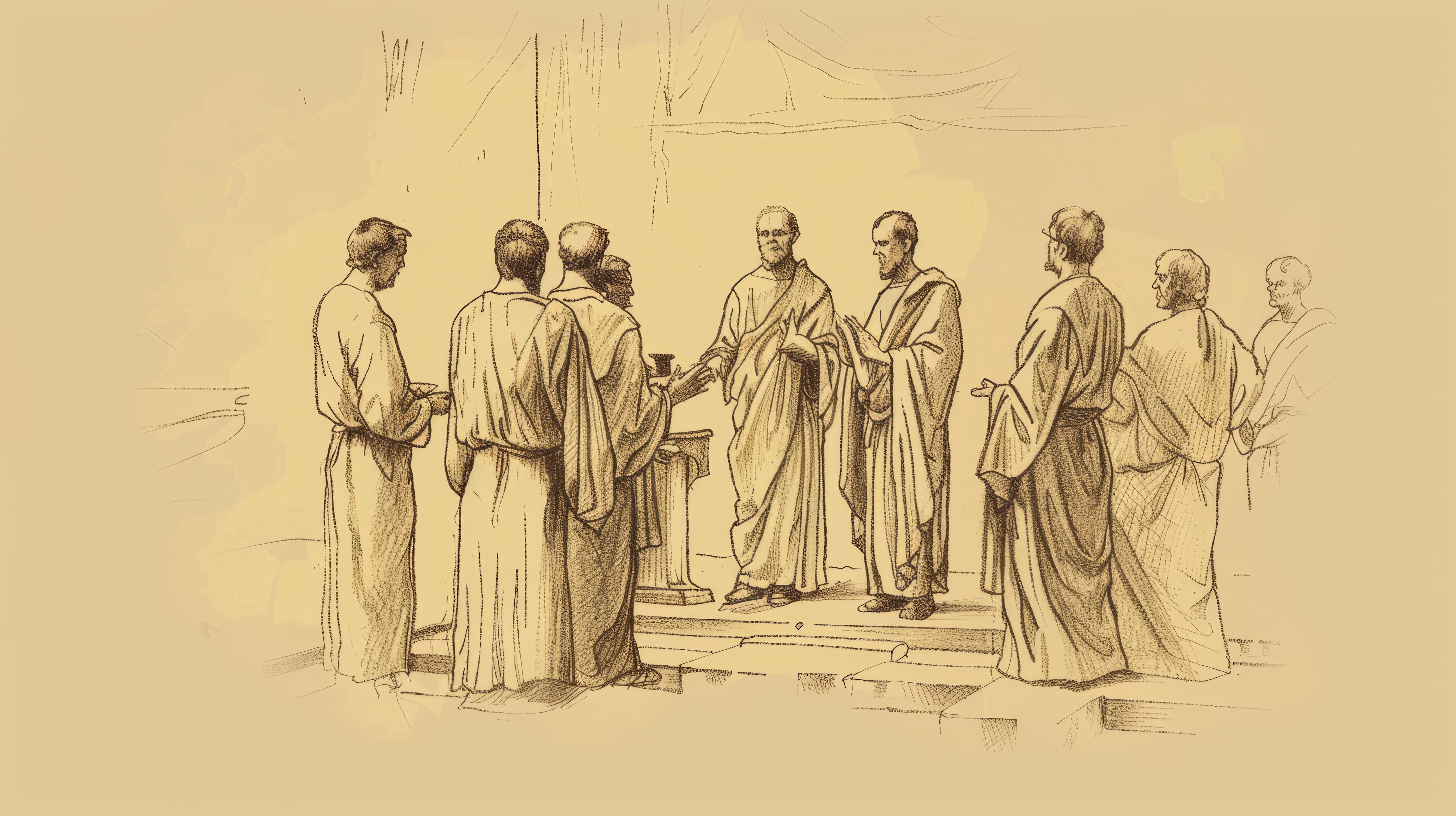
Introduction to 1 Corinthians
Published October 24, 2024
The Apostle Paul’s greeting to the church at Corinth is not merely traditional, but intentional, to put a finger right on the heart of the Corinthian problems – compromise with their secular environment. In this salutation, Paul calls his readers to live as Christians in the world, which means we are called to live holy lives, rather than compromising with the culture around us.
To see how this greeting leads us to holiness rather than compromise, three aspects of this opening bear consideration.
First, Paul highlights himself as a humble apostle.
Pride was one of the great cultural problems with the Corinthians and the church at Corinth. The Corinthians loved to show off their wealth, to climb the social and economic ladder, to rub shoulders with the important people of society, to be part of the who’s who of whatever group, and to be seen as significant. People in that culture went to great pains to achieve honor and glory by their intellect, accomplishments, status, position, wealth, friends, and anything else society deemed valuable.
Paul points away from this self-seeking pride, highlighting through his own example that the hallmark of the Christian calling is humility. Paul knows he merely happened to be the recipient of God’s undeserved grace and favor, and there is nothing about him of any great importance that would impress the Corinthians. If anything, Paul is trying to show his readers how happy he is to be unimpressive in the eyes of the world and to give all glory to God.
Second, Paul shows us how to live uncompromisingly for Christ in this present world by noting that the church is a holy assembly.
Today’s church often aspires to look as much like the world as possible without departing completely from Christ. We often downplay our differences, and show how well we fit into the culture, styles, trends, and the times. This was the precise problem facing many believers in Corinth. There was immense pressure to conform to the world, to be like the world, to fit in with the world, and to make sure Christians didn’t stand out too much. Compromise lurked around every corner in the city, which is why Paul must remind these believers (and us today) that the church is not meant to be like the world because she is a holy assembly.
Paul bears this point out in several ways. He first addresses these believers as the church of God which is at Corinth. The reason the church is the church of God is because our Lord Jesus Christ bought us with His blood on the cross. God’s church is not our church. None of our ministries, people, or the resources belong to us. The Corinthians needed this reminder, because they had the misguided idea the church existed for them to show off, to receive praise, and to exercise their gifts.
Paul also notes the church of God is at Corinth, desiring to see these believers embrace their true identity as those who belong to God’s church, not in their temporal circumstances as Corinthians.
Paul then highlights that they have been sanctified in Christ Jesus – set apart as holy for God, which means they must only think of themselves as belonging to God. They were for His use, for His purposes, and for His glory. Paul was not speaking of believers becoming more holy day by day (which is progressive sanctification), but he is referring to positional sanctification – something that is a fact about us because God has set us apart. Christians should never be ashamed to be different from the world.
Furthermore, Paul refers to these believers as saints by calling. Knowing all we do about the Corinthians’ problems, it’s amazing Paul can call them saints! From factions to sexual immorality to suing each other to abusing spiritual gifts to all kinds of other issues in this church, we might be tempted to think there weren’t many saints at Corinth, if any. Despite their many failures and weaknesses, though, Paul recognizes these believers have genuinely put their faith in Christ and are called to be saints. That’s why he’s writing to them, to remind them of who they are and to encourage them to live up to their calling in Christ.
The last thing Paul tells them about being a holy assembly is that they are not the only church God has in the world, but they are saints by calling along with all believers. The church of Jesus is not limited to one nation or geographic region, but it extends everywhere the gospel has penetrated the hearts of men. The Corinthians had a habit of thinking their way was the best, leading them to do things as they saw fit. Therefore, Paul reminds them that Christ is Lord of His church, that things must be done His way – not ours, and that He demands submission to His lordship by all Christians. The Corinthians were not the end-all-be-all of the church; they were just one assembly of God’s people throughout the world.
In other words, there is no room for pride in the church. No church has ever figured anything out. The most faithful church is simply doing what Christ commanded His church to do from the beginning. Where our church body, leadership and congregation are faithful to the Lord, we have no room to boast as if we have done anything. We are simply submitting to our Lord, who does everything for us by His grace, and we are just one of many churches around the world who declare that Jesus is Lord and who are set apart for His use.
Third, Paul prepares the Corinthians to be faithful against compromise by reminding them that they have a heavenly advantage.
This common greeting – grace to you and peace – by the Apostle Paul is loaded with important truth. Grace to you is a uniquely Christian blessing. Paul, here, is reminding the Corinthians that they cannot fight the temptation to compromise in their own power or strength, and they will not overcome it through the law. The power to live the Christian life is not found on tablets of stone or by looking within for inner strength but by walking in the grace of God empowered by the Spirit. We should walk by faith, believing that, when we face temptation to sin, God will be faithful and pour out grace that will enable us to obey Him and flee from sin.
Paul then adds peace to his blessing of the Corinthians. Peace speaks of all the spiritual blessings that come to those who have received the grace of God: peace of conscience, peace that guards our hearts and minds, peace with other believers, peace that is the fruit of the Spirit, and peace that encompasses every aspect of our lives in a restless world.
Grace and peace come from one source: God our Father and the Lord Jesus Christ. The Father and the Son, though distinct in their personhood, are united in bestowing upon us as believers grace to empower us and peace to guard us. This is our heavenly advantage. We have resources the world cannot understand or confiscate. The battle that would seek to destroy our souls through compromise with the world rages, but the world cannot defeat what God has so richly given us to equip us for this spiritual war.
In a world where we are constantly tempted to compromise and conform to the world around us, Paul calls us to live holy lives as God’s people.




0 Comments